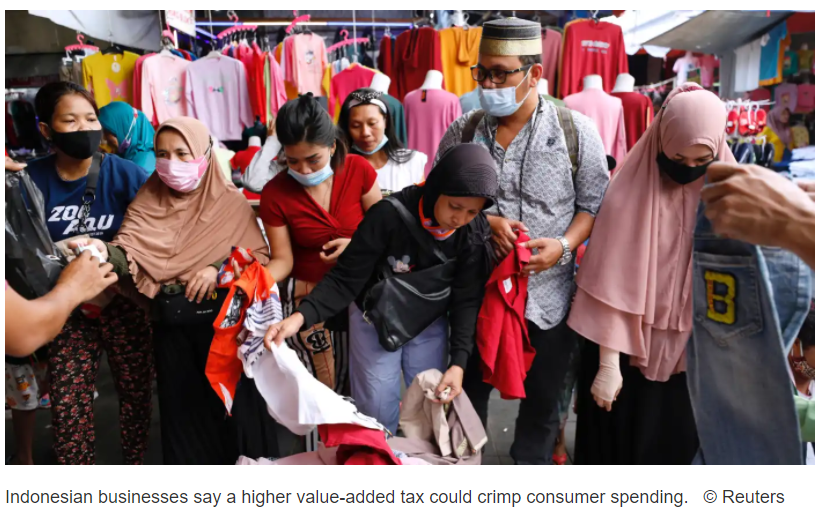Indonesia’s proposed VAT hike draws flak from businesses
JAKARTA — As Indonesia considers tax increases to cover stimulus spending sparked by the pandemic, the country’s business community warns that higher levies could dampen a nascent economic recovery after four straight quarters of contraction.
The Finance Ministry contemplates two options for a hike in the value-added tax: raising the current across-the-board rate, or enacting separate rates for different categories of goods and minimizing increases on food and other necessities. The ministry envisions the change taking effect next year.
The VAT options are part of a proposed package of tax changes that aim to address ballooning budget deficits as Indonesia spends heavily to pull the economy out of a coronavirus-fueled malaise. The country budgeted 695 trillion rupiah ($48.6 billion) last year for its National Economic Recovery program, widening its fiscal deficit to 6.09% of gross domestic product, nearly triple the 2019 level.
Indonesian businesses vehemently oppose a tax increase, on the grounds that the economic outlook remains uncertain in the country with the most coronavirus cases in Southeast Asia.
There are concerns that higher taxes would hinder consumer spending.
Roy Mandey, chairman of the Indonesian Retail Entrepreneurs Association urged the government to consider its actions more carefully. “This policy must be studied more deeply.”
Deputy Chairperson of Apindo, Shinta Widjaja Kamdani, said, “We are also worried that this policy will affect public sentiment to increase consumption in the short term so that the progress of economic recovery can be disrupted or take longer.”
Finance Minister Sri Mulyani Indrawati has called a VAT increase one way of bringing in revenue to overcome the country’s difficult financial situation.
While Indonesia remains in a recession, with GDP falling for four consecutive quarters, the decline slowed in the first quarter of 2021, and the fiscal deficit as a share of GDP is expected to narrow slightly this year to 5.7%.
President Joko Widodo in March 2020 temporarily relaxed rules limiting deficits to 3% of GDP, anticipating a need for large-scale stimulus. The measure lasts only until next year, with the cap returning in 2023.
Authorities worry about the risk of inflation. If deficits do not return to more normal levels by 2023, investors could lose confidence in government debt, potentially driving up prices more than a VAT hike would.
Source: https://asia.nikkei.com/Economy/Indonesia-s-proposed-VAT-hike-draws-flak-from-businesses


 Thailand
Thailand




